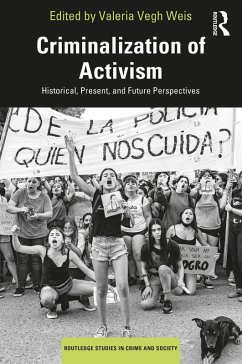Criminalization of Activism draws on a multiplicity of perspectives and case studies from the Global South and Global North to show how protest has been subject to processes of criminalisation over time.
Dieser Download kann aus rechtlichen Gründen nur mit Rechnungsadresse in A, B, BG, CY, CZ, D, DK, EW, E, FIN, F, GR, HR, H, IRL, I, LT, L, LR, M, NL, PL, P, R, S, SLO, SK ausgeliefert werden.
'This book is an outstanding example of the kind of insurgent scholarship we need in our troubled times. A breathtaking tour de force through the history, the present, and the futures of social movements on a global scale, Valeria Vegh Weis's Activism through the Language of Criminality is a must-read for activists, scholars and anyone engaged in the struggle to end the police state.' -Alessandro de Giorgi, Professor at the Department of Justice Studies, San José State University, Editor in Chief of Punishment & Society, Editorial Board Member of Social Justice
'This impressive collection of empirical and theoretical interventions show that as much as policing is a tool to manage unique local challenges to state authority, there are also remarkable global continuities. Throughout much of the world, police have become the primary tool for managing social movements erupting out of the contradictions of neoliberal austerity through a process of criminalizing dissent. This process is rooted not in the rule of law, but instead in a "state of exception" in which the perpetuation of state-backed regimes of exploitation trump legal frameworks and liberal democratic processes. In the end, this volume forces us to question the fundamental legitimacy of political policing and the political economic arrangements they enable.' -Alex S. Vitale, Author of The End of Policing
'At a time in which a global police state is in the making, this is a most opportune book. It must be read by all democrats because democracy is precisely what is at risk.'
Boaventura de Sousa Santos, Author of Toward a New Legal Common Sense
'The criminalization of activism, political dissidence and even the criminalization of the exercise of certain professions itself is more and more extensive in various areas of the world. When this work is published I do not even know how the criminal proceedings initiated against me by prison unions will be found for my denunciation of torture in prisons in Catalonia. Teachers, activists, musicians, graffiti artists, poets ... there is no specific profile. Criminalization increases in a similar proportion to the loss of rights and guarantees. But, for that reason, the (collective) struggle is more necessary than ever. As Walter Benjamin pointed out forever, "let us know how to organize pessimism'-Iñaki Rivera Beiras, Professor at the University of Barcelona, Director of the Observatory of the Penal System and Human Rights
'This is a fascinating collection that provides a great deal of valuable empirical information and rich theoretical insights about the ways in which protest and dissent can become criminalized. The case materials cover a broad geographic range and include both contemporary and historical protests. The editor's introduction provides a valuable framework for understanding both the under-criminalization of actions by the state, state agents and powerful elites that harm people and the over-criminalization of actions by the oppressed to survive and resist harm.' -Pamela Oliver, Professor Emerita of Sociology at the University of Wisconsin
'This is a much required work in contemporary times when neoliberal authoritarianism is involved in redefining the idea of 'democracy' itself. It shows one of the many ways in which neoliberal capitalism tries to exercise control of state over its citizens towards an unchallenged hegemonic ideological order. This dissent is no longer limited to only those who want to overthrow the state but even those who seek reforms that may impact interests of capital in specific ways. This work will go a long way as a reference material for anyone researching on democracy and modern nation state.'-Ravi Kumar, Associate Professor at the Department of Sociology, South Asian University
'This book makes a significant contribution to debates in the arena of social movements. It tells us responsible thinking (inside and outside the university) is treated as criminal and repressive brutality against such thinking is endorsed as legitimate activity. This is not a recent phenomenon. It has criminalized society and, has messed up social institutions, public spaces and everyday life. For the activists, it draws attention to the need for perseverance over several generations to make people at large see the creative significance of saying 'no' as a mode of opening up diverse ways seeing and living in this world.'-Savyasaachi, Professor at the Department of Sociology, Jamia Millia Islamia
'It would be impossible to over-emphasize the temporal significance of this book. As we enter an era of intensified criminalization of activism and dissent, bolstered by the impacts of the globalized policing of the Covid pandemic and further enabled by a proliferation of Artificial Intelligence, there could not be a better time to reflect on histories of criminalization and the importance of sustained activism in the face of violence and repression. In this edited volume, Valeria Vegh Weis has drawn together an exemplary collection of interdisciplinary scholar-activists focusing on such issues. Concept, theory and action are combined with issues of historic and contemporary significance - from environmental harm to the Nuremberg Trials to Black Lives Matter; India to Catalonia and Latin America, the breadth and depth of this book is astounding. It is essential reading for anyone interested in social control and the criminalization of activism and dissent.' -Victoria Canning, Senior Lecturer in Criminology at University of Bristol, Co-coordinator of the European Group for the Study of Deviance and Social Control, Associate Director of Oxford Border Criminologies
'This impressive collection of empirical and theoretical interventions show that as much as policing is a tool to manage unique local challenges to state authority, there are also remarkable global continuities. Throughout much of the world, police have become the primary tool for managing social movements erupting out of the contradictions of neoliberal austerity through a process of criminalizing dissent. This process is rooted not in the rule of law, but instead in a "state of exception" in which the perpetuation of state-backed regimes of exploitation trump legal frameworks and liberal democratic processes. In the end, this volume forces us to question the fundamental legitimacy of political policing and the political economic arrangements they enable.' -Alex S. Vitale, Author of The End of Policing
'At a time in which a global police state is in the making, this is a most opportune book. It must be read by all democrats because democracy is precisely what is at risk.'
Boaventura de Sousa Santos, Author of Toward a New Legal Common Sense
'The criminalization of activism, political dissidence and even the criminalization of the exercise of certain professions itself is more and more extensive in various areas of the world. When this work is published I do not even know how the criminal proceedings initiated against me by prison unions will be found for my denunciation of torture in prisons in Catalonia. Teachers, activists, musicians, graffiti artists, poets ... there is no specific profile. Criminalization increases in a similar proportion to the loss of rights and guarantees. But, for that reason, the (collective) struggle is more necessary than ever. As Walter Benjamin pointed out forever, "let us know how to organize pessimism'-Iñaki Rivera Beiras, Professor at the University of Barcelona, Director of the Observatory of the Penal System and Human Rights
'This is a fascinating collection that provides a great deal of valuable empirical information and rich theoretical insights about the ways in which protest and dissent can become criminalized. The case materials cover a broad geographic range and include both contemporary and historical protests. The editor's introduction provides a valuable framework for understanding both the under-criminalization of actions by the state, state agents and powerful elites that harm people and the over-criminalization of actions by the oppressed to survive and resist harm.' -Pamela Oliver, Professor Emerita of Sociology at the University of Wisconsin
'This is a much required work in contemporary times when neoliberal authoritarianism is involved in redefining the idea of 'democracy' itself. It shows one of the many ways in which neoliberal capitalism tries to exercise control of state over its citizens towards an unchallenged hegemonic ideological order. This dissent is no longer limited to only those who want to overthrow the state but even those who seek reforms that may impact interests of capital in specific ways. This work will go a long way as a reference material for anyone researching on democracy and modern nation state.'-Ravi Kumar, Associate Professor at the Department of Sociology, South Asian University
'This book makes a significant contribution to debates in the arena of social movements. It tells us responsible thinking (inside and outside the university) is treated as criminal and repressive brutality against such thinking is endorsed as legitimate activity. This is not a recent phenomenon. It has criminalized society and, has messed up social institutions, public spaces and everyday life. For the activists, it draws attention to the need for perseverance over several generations to make people at large see the creative significance of saying 'no' as a mode of opening up diverse ways seeing and living in this world.'-Savyasaachi, Professor at the Department of Sociology, Jamia Millia Islamia
'It would be impossible to over-emphasize the temporal significance of this book. As we enter an era of intensified criminalization of activism and dissent, bolstered by the impacts of the globalized policing of the Covid pandemic and further enabled by a proliferation of Artificial Intelligence, there could not be a better time to reflect on histories of criminalization and the importance of sustained activism in the face of violence and repression. In this edited volume, Valeria Vegh Weis has drawn together an exemplary collection of interdisciplinary scholar-activists focusing on such issues. Concept, theory and action are combined with issues of historic and contemporary significance - from environmental harm to the Nuremberg Trials to Black Lives Matter; India to Catalonia and Latin America, the breadth and depth of this book is astounding. It is essential reading for anyone interested in social control and the criminalization of activism and dissent.' -Victoria Canning, Senior Lecturer in Criminology at University of Bristol, Co-coordinator of the European Group for the Study of Deviance and Social Control, Associate Director of Oxford Border Criminologies









